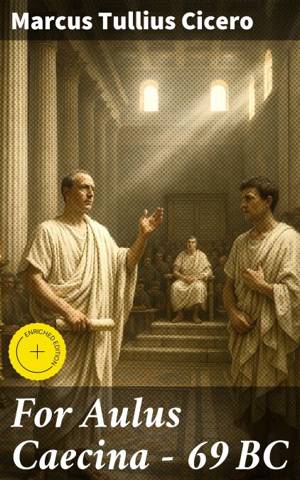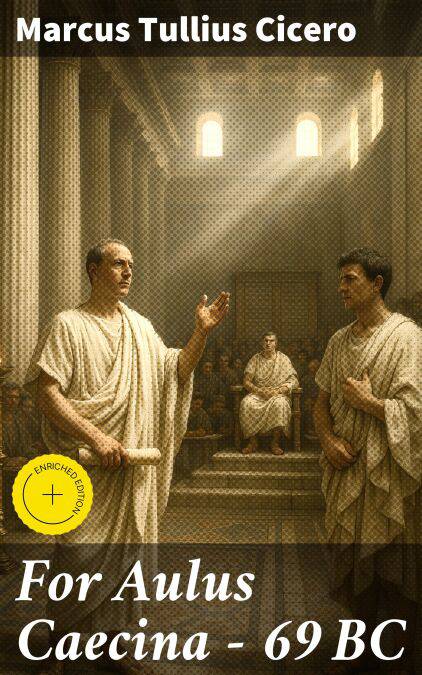
- Retrait en 2 heures
- Assortiment impressionnant
- Paiement sécurisé
- Toujours un magasin près de chez vous
- Retrait gratuit dans votre magasin Club
- 7.000.0000 titres dans notre catalogue
- Payer en toute sécurité
- Toujours un magasin près de chez vous
For Aulus Caecina — 69 BC EBOOK
Enriched edition. Exploring Roman Politics and Justice Through Masterful Oratory
Marcus Tullius Cicero
Ebook | Anglais
1,99 €
+ 1 points
Description
In 'For Aulus Caecina,' Cicero masterfully navigates the complexities of Roman legal proceedings, employing a sophisticated rhetoric that intertwines personal appeal with legal argumentation. This oration, delivered in 69 BC, emerges within the broader context of Roman legal struggles and the political machinations of the late Republic. Cicero's eloquent prose not only serves his client, Aulus Caecina, but also reflects the intricacies of Roman society, morality, and the art of persuasion. His style is characterized by a careful balance of pathos and logos, skillfully engaging the audience's emotions while providing substantive legal reasoning. Marcus Tullius Cicero, a statesman, philosopher, and orator, dedicated much of his life to understanding and preserving the principles of justice in a tumultuous Republic. His extensive experience in the political arena, including his renowned consulship and his role as a legal advocate, profoundly influenced his perspectives on law and morality. Cicero's writings capture his passionate defense of the Roman Republic's ideals and his belief in the Senate's role in governance, all of which culminate in the pressing need to advocate for justice as demonstrated in this oration. For any reader interested in the foundations of Western rhetoric, law, and political philosophy, 'For Aulus Caecina' is an indispensable text. Cicero's argumentation not only provides insight into the specifics of Roman law but also resonates with contemporary themes of justice and civic duty. This work is a testament to the enduring power of eloquence in the pursuit of justice, making it essential reading for scholars, students, and anyone enthralled by the art of persuasion.
In this enriched edition, we have carefully created added value for your reading experience:
- A succinct Introduction situates the work's timeless appeal and themes.
- The Synopsis outlines the central plot, highlighting key developments without spoiling critical twists.
- A detailed Historical Context immerses you in the era's events and influences that shaped the writing.
- An Author Biography reveals milestones in the author's life, illuminating the personal insights behind the text.
- A thorough Analysis dissects symbols, motifs, and character arcs to unearth underlying meanings.
- Reflection questions prompt you to engage personally with the work's messages, connecting them to modern life.
- Hand‐picked Memorable Quotes shine a spotlight on moments of literary brilliance.
- Interactive footnotes clarify unusual references, historical allusions, and archaic phrases for an effortless, more informed read.
In this enriched edition, we have carefully created added value for your reading experience:
- A succinct Introduction situates the work's timeless appeal and themes.
- The Synopsis outlines the central plot, highlighting key developments without spoiling critical twists.
- A detailed Historical Context immerses you in the era's events and influences that shaped the writing.
- An Author Biography reveals milestones in the author's life, illuminating the personal insights behind the text.
- A thorough Analysis dissects symbols, motifs, and character arcs to unearth underlying meanings.
- Reflection questions prompt you to engage personally with the work's messages, connecting them to modern life.
- Hand‐picked Memorable Quotes shine a spotlight on moments of literary brilliance.
- Interactive footnotes clarify unusual references, historical allusions, and archaic phrases for an effortless, more informed read.
Spécifications
Parties prenantes
- Auteur(s) :
- Traducteur(s):
- Editeur:
Contenu
- Nombre de pages :
- 45
- Langue:
- Anglais
Caractéristiques
- EAN:
- 4064066444273
- Date de parution :
- 10-04-21
- Format:
- Ebook
- Protection digitale:
- Digital watermarking
- Format numérique:
- ePub

Seulement chez Librairie Club
+ 1 points sur votre carte client de Librairie Club
Les avis
Nous publions uniquement les avis qui respectent les conditions requises. Consultez nos conditions pour les avis.






